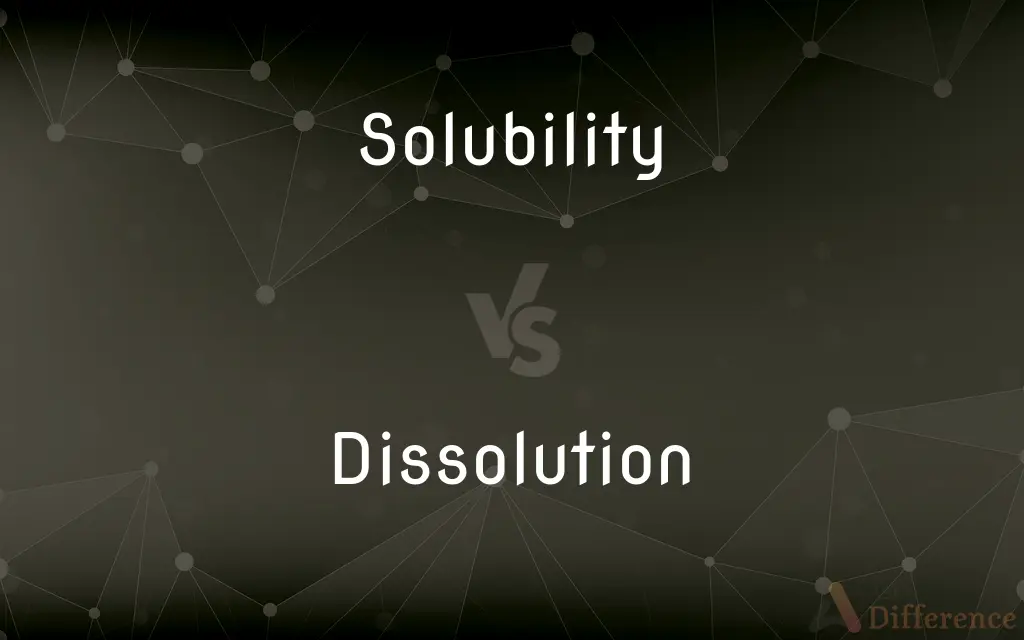Solubility vs. Dissolution — What's the Difference?
By Urooj Arif & Fiza Rafique — Updated on March 13, 2024
Solubility measures a substance's capacity to dissolve, while dissolution is the process of a substance dissolving in a solvent.

Difference Between Solubility and Dissolution
Table of Contents
ADVERTISEMENT
Key Differences
Solubility is a property that indicates how much of a substance (solute) can be dissolved in a solvent at a given temperature and pressure, leading to a homogeneous mixture. On the other hand, dissolution is the actual process where the solute interacts with the solvent, breaking down into ions, atoms, or molecules, and becomes uniformly dispersed.
While solubility is often expressed as a concentration, representing the maximum amount of solute that can dissolve in a solvent to form a saturated solution, dissolution is a dynamic process that can be influenced by factors such as agitation, temperature, and the presence of other substances. Dissolution rates can vary widely, even for substances with similar solubilities.
Solubility is a characteristic inherent to the chemical nature of both the solute and the solvent, and it can be affected by temperature, pressure, and the presence of other solutes. Dissolution, however, involves a series of steps including solute-solvent interactions, breaking of solute-solute and solvent-solvent interactions, and the formation of new solute-solvent interactions, which can be influenced by external conditions.
The concept of solubility is critical in various fields, such as pharmacology, where it determines the effectiveness of a drug by its bioavailability, and environmental science, where it affects the distribution of pollutants. Dissolution plays a key role in processes like the absorption of nutrients in the body, the preparation of pharmaceuticals, and the weathering of rocks and minerals.
Understanding the distinction between solubility and dissolution is important in many practical applications, such as formulation chemistry, environmental engineering, and materials science. While solubility provides a limit to how much solute can be dissolved, dissolution describes how the solute becomes incorporated into the solvent to form a solution.
ADVERTISEMENT
Comparison Chart
Definition
The maximum amount of a substance that can dissolve in a solvent.
The process by which a substance dissolves in a solvent.
Expressed As
Concentration (e.g., g/L, mol/L)
Process rate, which can be influenced by various factors.
Influencing Factors
Chemical nature, temperature, pressure, and presence of other solutes.
Agitation, temperature, surface area, and presence of catalysts.
Key Importance
Determines the extent to which a substance can be dissolved.
Involves the interaction and dispersion of solute in the solvent.
Application
Important in pharmacology, environmental science, and chemistry.
Critical in pharmaceuticals, nutrition, and environmental processes.
Compare with Definitions
Solubility
Typically quantified as grams of solute per 100 grams of solvent.
The solubility of sugar in water is high, allowing for sweet solutions.
Dissolution
The act or process of a solute becoming dispersed uniformly throughout a solvent.
The dissolution of a sugar cube in tea involves the cube breaking down into individual sugar molecules.
Solubility
Solubility limits can lead to the formation of precipitates in oversaturated solutions.
Exceeding the solubility of calcium carbonate in water can result in scale formation.
Dissolution
Involves solute-solvent interactions, including the breaking and forming of bonds.
The dissolution of salt in water involves the dissociation of Na+ and Cl- ions.
Solubility
Essential in formulating medicines and understanding environmental pollutant dispersion.
The solubility of a drug determines its effectiveness in the body.
Dissolution
Can be influenced by factors such as agitation, surface area, and temperature.
Stirring can increase the rate of dissolution by dispersing the solute particles.
Solubility
The capacity of a substance to dissolve in a solvent to form a homogeneous mixture.
The solubility of salt in water decreases as the temperature drops.
Dissolution
The study of dissolution kinetics helps in understanding the speed and mechanism of dissolution.
Understanding the kinetics of dissolution is crucial in optimizing industrial processes.
Solubility
Influenced by temperature, pressure, and the chemical nature of solute and solvent.
Increasing pressure can increase the solubility of gases in liquids.
Dissolution
Key in drug delivery, nutrient absorption, and chemical reactions.
The dissolution rate of a medication can affect its bioavailability and therapeutic effect.
Solubility
Solubility is the property of a solid, liquid or gaseous chemical substance called solute to dissolve in a solid, liquid or gaseous solvent. The solubility of a substance fundamentally depends on the physical and chemical properties of the solute and solvent as well as on temperature, pressure and presence of other chemicals (including changes to the pH) of the solution.
Dissolution
The action of formally ending or dismissing an assembly, partnership, or official body
The Prime Minister asked the queen for a dissolution of Parliament
The dissolution of their marriage
Solubility
The quality or condition of being soluble.
Dissolution
Debauched living; dissipation
An advanced state of dissolution
Solubility
The amount of a substance that can be dissolved in a given amount of solvent.
Dissolution
Decomposition into fragments or parts; disintegration.
Solubility
The condition of being soluble.
Dissolution
Indulgence in sensual pleasures; debauchery.
Solubility
(chemistry) The amount of a substance that will dissolve in a given amount of a solvent, to give a saturated solution, under specified conditions.
Dissolution
Termination or extinction by disintegration or dispersion
The dissolution of the empire was remarkably swift.
Solubility
The quality, condition, or degree of being soluble or solvable; as, the solubility of a salt; the solubility of a problem or intricate difficulty.
Dissolution
Annulment or termination of a formal or legal bond or relationship.
Solubility
The tendency to separate readily into parts by spurious articulations, as the pods of tick trefoil.
Dissolution
Formal dismissal of an assembly or legislature.
Solubility
The quality of being soluble
Dissolution
Reduction to a liquid form; liquefaction.
Solubility
The quantity of a particular substance that can dissolve in a particular solvent (yielding a saturated solution)
Dissolution
The termination of an organized body or legislative assembly, especially a formal dismissal.
Dissolution
Disintegration, or decomposition into fragments.
Dissolution
Dissolving, or going into solution.
Dissolution
The quality of being dissolute.
He led a life of dissolution, drinking and gambling almost daily.
Dissolution
The act of dissolving, sundering, or separating into component parts; separation.
Dissolutions of ancient amities.
Dissolution
Change from a solid to a fluid state; solution by heat or moisture; liquefaction; melting.
Dissolution
Change of form by chemical agency; decomposition; resolution.
The dissolution of the compound.
Dissolution
The state of being dissolved, or of undergoing liquefaction.
A man of continual dissolution and thaw.
Dissolution
The new product formed by dissolving a body; a solution.
Dissolution
Destruction of anything by the separation of its parts; ruin.
To make a present dissolution of the world.
Dissolution
Corruption of morals; dissipation; dissoluteness.
Dissolution
The process of going into solution;
The dissolving of salt in water
Dissolution
Separation into component parts
Dissolution
Dissolute indulgence in sensual pleasure
Dissolution
The termination of a meeting
Dissolution
The termination of a relationship
Common Curiosities
Why is solubility important in medicine?
Solubility is crucial in medicine as it affects the drug's absorption, distribution, metabolism, and excretion, thereby impacting its effectiveness.
What is solubility?
Solubility is the property of a substance that indicates its ability to dissolve in a solvent to form a stable solution at a specific temperature and pressure.
How do solubility and dissolution relate to each other?
Solubility defines the maximum extent to which a solute can dissolve, while dissolution is the process through which this solute actually dissolves in a solvent.
How can the rate of dissolution be increased?
The rate of dissolution can be increased by stirring, increasing the surface area of the solute, or elevating the temperature.
What does dissolution mean?
Dissolution is the process where a solute disperses and becomes uniformly distributed within a solvent, forming a solution.
Is solubility always a constant value?
Solubility can vary with conditions such as temperature, pressure, and the chemical environment, so it is not always a constant value for a substance.
Can a substance have high solubility but slow dissolution?
Yes, a substance can be highly soluble but may dissolve slowly due to factors like large particle size or low temperature.
How is solubility determined?
Solubility is determined experimentally by measuring the maximum amount of solute that can dissolve in a solvent at equilibrium conditions.
What is the impact of dissolution on water quality?
Dissolution affects water quality by determining the concentration and distribution of soluble substances, which can be nutrients or pollutants.
Does pressure affect solubility?
Pressure significantly affects the solubility of gases in liquids; increasing pressure usually increases their solubility.
What is the significance of dissolution in geology?
Dissolution plays a key role in geology in the weathering of rocks, formation of caves, and mineral deposition.
How do solvents influence solubility?
The chemical compatibility between the solute and solvent, often summarized as "like dissolves like," greatly influences solubility.
What role does dissolution play in the environment?
Dissolution processes are important in the environment for nutrient cycling, soil formation, and the distribution of pollutants.
Can solubility change with temperature?
Yes, solubility can change with temperature; for many solids in liquids, solubility increases with temperature, but this is not a universal rule.
What factors can affect the solubility of a substance?
Factors include the nature of the solute and solvent, temperature, pressure, and the presence of other substances.
Share Your Discovery

Previous Comparison
Wart vs. Pimple
Next Comparison
Caipirinha vs. CaipiroskaAuthor Spotlight
Written by
Urooj ArifUrooj is a skilled content writer at Ask Difference, known for her exceptional ability to simplify complex topics into engaging and informative content. With a passion for research and a flair for clear, concise writing, she consistently delivers articles that resonate with our diverse audience.
Co-written by
Fiza RafiqueFiza Rafique is a skilled content writer at AskDifference.com, where she meticulously refines and enhances written pieces. Drawing from her vast editorial expertise, Fiza ensures clarity, accuracy, and precision in every article. Passionate about language, she continually seeks to elevate the quality of content for readers worldwide.














































